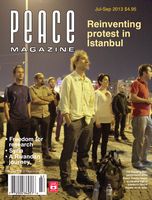
Peace Magazine Jul-Sep 2013, page 4. Some rights reserved.
Search for other articles by Metta Spencer here
Some rebellions are like festivals; others are bloodbaths; some are in between; and still others start as festivals and end as civil wars. Canadians are rooting for the protesters in Taksim Square and Gezi Park, who discovered their own higher nature by supporting each other against the rule of a democratically elected prime minister who had become heavy-handed and oppressive. As Erdogan showed his own lower nature with chemically enhanced water cannons, the protesters retained their nonviolent discipline. A single man stood in the square, silently staring for many hours at a picture of the nation’s founder, Ataturk. When he was ousted, others started standing in silence all over the country. We wish them well.
The Syrian rebellion started nonviolently too, in emulation of the Tunisians and Egyptians, but soon members of the Syrian Army came over to their side, bringing weapons, and the fighting began. A bad move! Only a small minority of armed rebellions succeed or lead to democracy, but the odds of success are doubled for rebels who remain nonviolent.
Now the Syrian rebels are an incompatible assortment of armed groups, including Al Nusra (a branch of Al Qaeda), who have already begun enforcing shari’a law in the areas they have captured.
No doubt the original nonviolent movement was justifiable. According to Freedom House, the Syrian government is (and has long been) one of the worst in the world; its score of 7 is as low as the scale goes. Other measures of the quality of governance assign Syria a similar abysmal rating. For example, the Political Atlas of the Modern World, created in 2010 by leading Russian scholars, assigns Syria the 157th rank among 192 countries in terms of “Institutional Basis of Democracy.”
Yet even the most wretched government may be preferable to a war that has killed over 93,000 Syrians. Until they can get rid of Assad by nonviolent means, probably the majority of his subjects would prefer to stop the war and live under the old system. (See the article on page 26 for a pro-government analysis.)
It seems that Barack Obama fell into a trap of his own making. Having announced that the Syrian government’s use of chemical weapons would be a “red line,” he could not continue refusing to send ammunition to the rebels when he could no longer deny the evidence against Assad. And so the war will probably go on even longer, for the bullets he sent are only a token of the weaponry required to turn the tide. Let’s hope that, as the rebels begin to lose decisively, Obama does not succumb to more pressure to increase American participation. The odds of successful negotiations are now worse than ever. There is no festival in Damascus, and we can root for neither side.

Peace Magazine Jul-Sep 2013, page 4. Some rights reserved.
Search for other articles by Metta Spencer here